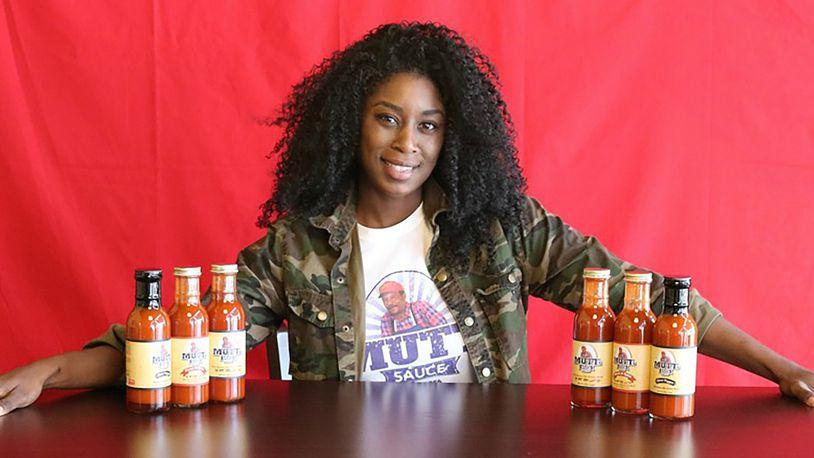Summary
Charlynda Scales is the founder of Mutt’s Sauce and a U.S. Air Force veteran. Scales created her company to sell her family’s generational savory sauce recipe. Read for how she managed to overcome issues with starting a business and made it thrive.
The content on this page is accurate as of the posting date; however, some of our partner offers may have expired. Please review our list of best credit cards, or use our CardMatch™ tool to find cards matched to your needs.

Charlynda Scales, Founder of Mutt’s Sauce
“American made, veteran-owned.” This proud statement is prominently displayed on the Mutt’s Sauce website because it’s that important to Charlynda Scales. She is the founder of the company and also a U.S. Air Force veteran. So was her grandfather, Charlie “Mutt” Ferrell, who invented the savory sauce recipe.
“He received his call sign, Mutt, for his adaptive personality,” says Scales. “There wasn’t a place in the world that he went where he didn’t have a friend. Besides being passionate about service, he was also passionate about creating a solution to the wastefulness of condiments. He thought people should have one sauce that could be used for everything. He made the sauce in 1956, and my family ate it for multiple generations. It’s called ‘the sauce for every meal.'”
Mutt’s Sauce, an all-purpose tomato-based condiment, was strictly a family affair for generations. When her grandfather died in 2005, the family wasn’t sure where the recipe went. Assuming that he was the sole keeper of the delicious formula, they thought the secret passed on along with Mutt.
Not so. It turned out that Mutt did reveal the recipe to one person: Scales, who decided to honor her grandfather by taking the sauce to market in 2013. The bottle bears Mutt’s image.
Since then, sales have been strong, and the company is a success – despite a few bumps in the road. Part of her recipe for success is her credit card, which helps her manage cash flow.
Check out all the answers from our credit card experts.
What was it like to launch this business, and did you make any mistakes?
When I started Mutt’s Sauce, I bootstrapped the company, using funds I was saving to buy myself a new car. During the nascent stages of my company, I was not thinking about my return on investment. And after receiving earnings, one of my earliest purchases was one thousand custom writing pens. I don’t know why I thought the pens would help my business, but I cringe at the thought of wasting money on things that did not yield a return.
One of my mentors asked me how much sauce I sold by handing out pens. “People need to taste and believe,” my mentor said. “A customized pen doesn’t make me want to buy sauce.” It was an expensive lesson. I have one pen left, and I keep it on my desk to remind me to make smart financial decisions.
John Soutar is a mentor I acquired through the SCORE program. When I first consulted with him, I told him I had no idea where to start. Soutar smiled and explained that I needed to create a checklist that outlines how to make and sell a tomato-based food product. “Just do step one. File your business license, and we will move at the speed of determination.” That speed is as fast you’re determined to make it happen. Four months later, we had our first production day. An Amish company in Chillicothe, Ohio, hand-poured 700 bottles, and we sold them all in one week.
Even with careful planning and a great mentor, did any expenses throw you for a loop?
All of them, because I had no prior experience in food manufacturing. What did I find most surprising? If you want to be in retail grocery, prepare to take a huge cut in profit margin. The manufacturer gets paid upfront, before any work is done. You need to have the capital on hand to pay them, which can be $10,000 to $20,000 depending on how many flavors you produce. Other people take part of your profit margin, too, such as the distributor, food broker and wholesaler (the grocery store).
Another is that clients do not always have to pay you immediately. The terms “Net 30/60/90” mean they have one to three months before sending you payment for all products you manufactured. In the meantime, you still need to pay your bills, make payroll and keep operations going daily.
How have you been using credit cards for the business? What types of expenses do you typically charge?
I charge pretty much everything for the business except for manufacturing to my credit card. It builds rewards and helps when you’re stuck in those net payment situations.
I currently use the U.S. Bank Triple Cash Rewards Visa® Business Card (which offers 3% cash back on a wide variety of eligible purchases and 1% cash back on everything else**). I chose it because U.S. Bank had a local branch, which was important, and they provided a lot of support during the pandemic for small businesses.
**Earn 3% cash back on eligible purchases at gas and EV charging stations, office supply stores, cell phone service providers, and restaurants. Plus, earn 1% cash back on all other eligible purchases.
How have you been managing the financial aspects of running Mutt’s Sauce?
With food manufacturing, you’re either holding money in inventory or waiting on a net payment. I am very careful about holding more inventory than there is a demand for, and I time my sales to ensure constant cash flow.
What about credit? Is it important to you to make sure yours is in good standing?
Yes, because good credit is an indicator of reliability and scalability. Eventually, you will want to either grow the company or sell it, both of which require a sound financial foundation.
Are there any plans for the future you want to share?
The company was hit hard by the pandemic. Because of that, we were forced to restart with a new business model. Currently, I’m focused on scaling it as an e-commerce brand, taking the time to refine processes and maximize online sales channels.
I wish I would’ve started e-commerce earlier. Mentors told me in 2018 that I should be selling more online. I couldn’t wrap my brain around the concept of selling food online, so I learned the hard way during the pandemic.
Imagine you’re talking to people who want to start their own business. What advice do you have for them regarding credit cards and borrowing money?
Make sure you can pay off the debt you incur. Costs can add up fast when scaling. You don’t want to get caught in a situation where you have high demand but no capital or lots of inventory but no demand. It’s a balance, but if you don’t learn how to handle both situations, you’ll find yourself drowning in debt fast.
Anything else you would tell hopeful entrepreneurs to keep them inspired?
My mantra is: “When you believe in something bigger than yourself, rock bottom has a trampoline.” Simply put, everyone has a purpose, and rock bottom does not exist – it’s just a moment of reflection and reset. The most powerful thing an entrepreneur can do is not give up; your vision is tied to your gift.
The frustrating part about seeing your success as a business owner is to trust the timing. Often our dreams are not denied but just delayed. Keep going.
Editorial Disclaimer
The editorial content on this page is based solely on the objective assessment of our writers and is not driven by advertising dollars. It has not been provided or commissioned by the credit card issuers. However, we may receive compensation when you click on links to products from our partners.





